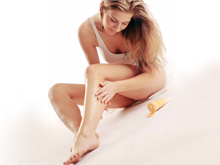Health Topics
-
Healthy Living
-
|
|
May 2011
|
| The Holiday Skincare Guide |
| Dr. Sachin Varma |
| |
 |
One thing worse than rash driving, is to have a rash on your skin. Especially if you’re on a holiday and you don’t know a good doctor around. |
Here is the definitive guide to help you differentiate the milder rash from the severe one – so that you can manage the rash before medical help can come by. It can also help you judge when to take medical help and when it can wait – and thus save your holiday!
5 Rash Ways
Thankfully, the incidence of severe rashes during a holiday is rare. Here are the common ones though, with advice on how to take care of them.
- Mosquito Bites: Papularurticaria, as it is medically known, usually occurs as small red eruptionson exposed areas, and is especially common in children. The skin would be mildly tender but otherwise, the person would be fine.
- Usually, mild Calamine lotion or mild steroid cream would be sufficient to take care of this - there is no need to worry or call a doctor. Wearing covered clothes would help.
- Insect Bites: More severe insect bites can produce large,reddish,painfuleruptions with surrounding inflammation.
- An oral antihistamine like Levocetrizene 5mg and topical steroid antibiotic combination cream would usually suffice to treat this. Medical help is needed only if it causes systemic discomfort like fever or if one suspects the insect to be poisonous.
- Urticaria refers to a group of disorders where red patches and wheals (raised marks) occur on the skin. Urticarial disease is thought to be caused by the release of histamine and other inflammation mediators (cytokines) from cells in the skin. Urticaria can occur commonly on holidays as people experiment new types of food and wines on a holiday.Newly tried seafood and coloured food substances can commonly cause allergies, especially if one is allergy prone.
- As long as there is no breathing difficulty, taking an anti-allergic like Levocetrizene 5mg or Fexofenadine 180mg orally, would suffice. But if there is breathing difficulty or mucosal swelling, do contact a doctor immediately.
- Photosensitive Rash: On a beach holiday, the sun exposed areas of the skin – the face and arms especially – are susceptible to scaly, abnormally red rashes. This is due to acute sunburn or allergy to sunlight, and the blood vessels dilating as a result.
- Using a good quality sunscreen and limiting sunbathing (as if Indians require it!) can prevent it. Applying a topical steroid cream along with a good quality sunscreen, would usually be enough to bring this under control.
- Generalised Rash: This can be tricky as there are lots of conditions that can produce generalised scaly red rashes all over body. The commonest are viral fever like Epstein Barr virus, Cytomegalovirus, etc. Others like typhoid, malaria, dengue and Lyme’s Boreliosis can produce allergy too. Generally, these rashes are extensive. It is difficult to give a general advice on when to go to a doctor, in this case.
- However, a general rule is that timing of medical help should depend upon the general health of the person. If the person is sick with high fever, looks toxic or has other symptoms like diarrhoea, breathing difficulty or other causes of concern, medical help should be sought immediately. In other cases,having aParacetamol and anti- allergic can help until medical help can come by.
Additional Help
People who are highly allergy prone or suffer from severe asthma should take extra precautions while on a holiday.
- Plan your holiday and know your destination well. The pollution and allergen levels of the destination should be checked. The internet could be a great help for this. Go well prepared with proper anti allergic medication.
- In case you are staying in a hotel, prefer non-smoking rooms and non-carpeted rooms.
- Certain five stars hotels do have allergy friendly rooms.These include pillows and mattresses covered with hypoallergenic linens and dust free vacuum cleaned surroundings in the room. Do check if your hotel has such an option.
- In case you are allergic to certain kinds of foods, don’t forget to mention that on your airline food option while booking the ticket. Also,do mention the same to the chef, when ordering a food with multiple ingredients at a restaurant.
- If your allergy is severe, carry your emergency medication in your hand baggage.Don’t forget to carry a day’s extra dose, just in case you’re delayed somewhere.
Make sure you’ve taken all the possible precautions and your trip could become as enjoyable as possible. |
 |
Dr. Sachin Varma is Consultant Dermatologist at Apollo Gleneagles Hospital, Kolkata |
|
|